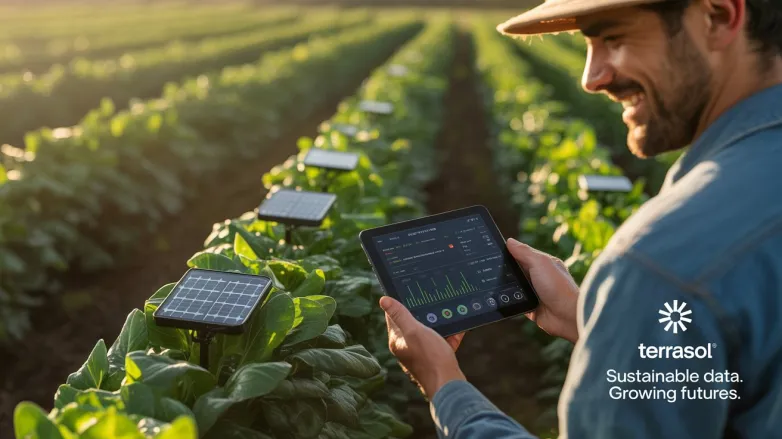Biodegradable Solar Cells Revolutionize Farm Data Collection
Jun 19, 2025 12:15 PM ET
- Revolutionize farming with VTT's biodegradable solar cells: eco-friendly energy for precise crop monitoring, directly from plant stems or leaves.

Finnish research institution VTT has unveiled a biodegradable solar cell module designed to enhance agricultural data collection. This innovative technology can be directly attached to the stem of a plant or a large leaf, providing a sustainable energy source for sensors and data-gathering devices on farms.
The solar cell's biodegradable nature ensures minimal environmental impact, aligning with eco-friendly agricultural practices. This development represents a significant step forward in integrating renewable energy solutions into farming, potentially improving data accuracy and efficiency in monitoring crop health and growth.
How Can Biodegradable Solar Cells Revolutionize Agricultural Data Collection and Sustainability?
- Enhanced Data Collection: Biodegradable solar cells can power sensors that collect real-time data on soil moisture, temperature, and nutrient levels, leading to more precise and timely agricultural interventions.
- Sustainability: By using biodegradable materials, these solar cells reduce waste and environmental impact, aligning with sustainable farming practices and reducing reliance on non-renewable energy sources.
- Cost-Effectiveness: The use of biodegradable materials can potentially lower production costs, making advanced agricultural technology more accessible to small and medium-sized farms.
- Improved Crop Management: With continuous power supply from solar cells, farmers can receive constant updates on crop conditions, enabling better decision-making and resource management.
- Reduced Carbon Footprint: Utilizing solar energy reduces the carbon footprint of agricultural operations, contributing to global efforts in combating climate change.
- Scalability: The technology can be easily scaled and adapted to different types of crops and farming environments, offering flexibility and broad applicability.
- Increased Yield: By optimizing resource use and improving crop monitoring, biodegradable solar cells can contribute to increased agricultural productivity and yield.
- Integration with IoT: These solar cells can seamlessly integrate with Internet of Things (IoT) devices, enhancing connectivity and data analysis capabilities on farms.
- Resilience to Climate Change: By providing reliable energy for data collection, farmers can better adapt to changing climate conditions and mitigate risks associated with extreme weather events.
- Promotion of Circular Economy: The use of biodegradable materials supports a circular economy model, where products are designed to be reused, recycled, or decomposed, minimizing waste.
Also read

